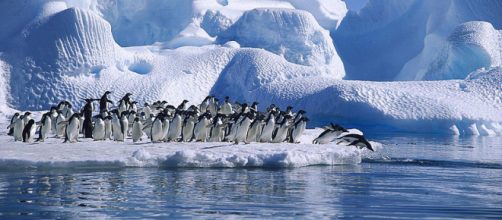There had been fears that melting of ice shelves in Antarctica due to Global warming could have an adverse effect on living beings like penguins. However, a research team from the US-based Woods Hole Oceanographic Institution have reported that there is a huge colony of Adelie Penguins there. This find has put to rest speculations that their numbers were reducing.
Sky News reports that the research team spotted millions of penguins on the Danger Islands which is not known to be the natural habitat of these birds. This region consists of nine rocky islands and is located on the tip of Antarctic Peninsula.
The data on the numbers is based on the first bird census that was carried out by the team.
How the discovery was made
Danger Islands are in a remote portion of Antarctica, and access is difficult. Even in summer, one has to struggle to reach the place because of the thick sea ice. Study co-author Heather Lynch had teamed up with Mathew Schwaller from NASA four years ago to study penguins in the region. The two of them examined satellite images and realized that the population was quite impressive. She wanted to learn more and embarked on an expedition with a team of researchers.
The process was a long one. The team arrived in December 2015 and began the count using drones to capture images every second.
Subsequently, these images were joined to get a comprehensive picture.
The findings were interesting. The eastern side of Antarctic Peninsula showed a decline in the population of the birds. This could be attributed to global warming and the melting of sea ice. However, on the eastern side, the Adelie penguins were flourishing. This species is one of five species that live in and around Antarctica and are small in size. Hopefully, they will continue to remain in spite of the vagaries of nature.
Adelie penguins spring a surprise
The very location of the supercolony of Adelie penguins has made it possible for them to remain hidden from the world until the research team landed on Antarctica to search for signs of nesting birds.
The Independent UK adds that Professor Heather Lynch, an ecologist at Stony Brook University, played an important role in bringing this information to the forefront. Professor Michael Polito, an ecologist at the Louisiana State University, was also a part of the team.
The revelation implies that penguins are safe as long as their environments are undisturbed by factors like global warming, fishing, and direct human disturbance. Environmentalists want a protected area status for the Weddell Sea, where Danger Islands are located.


